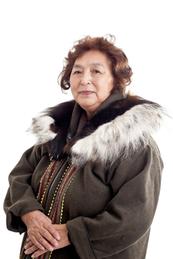 |
|
| Margaret-Olemaun Pokiak-Fenton | |
Margaret-Olemaun Pokiak-Fenton, an Inuvialiut knowledge keeper, residential school survivor, and co-author of the bestselling book Fatty Legs: A True Story, died June 2. She was 84. In a tribute, her publisher, Annick Press, said: "Young readers all over the world have been introduced to the harsh reality of residential schools through her books.... Margaret-Olemaun met with thousands of school children to share her experiences and to share her message of hope and survival so that future generations would understand the devastating legacy of the schools."
Fatty Legs, its sequel A Stranger at Home, and young reader editions When I Was Eight and Not My Girl, have sold more than a quarter of a million copies and collected over 20 awards and distinctions. Christy Jordan-Fenton, who co-authored Pokiak-Fenton's books and is her daughter-in-law, observed: "I wanted my children to have no bigger hero than their grandmother. Being raised in a traditional way taught [Margaret-Olemaun] to be her own hero."
Although she went by the the name Margaret when her stories were originally published, Pokiak-Fenton "would deepen her connection with her birth name, Olemaun, over the course of her later years," and by the publication of the 10th anniversary edition of Fatty Legs, she began using Olemaun again, Annick Press noted, adding: "Her life's story, published two years before the work of the Truth and Reconciliation Commission began, would prove to be among the first of scores of heart-rending stories from fellow survivors. Margaret-Olemaun's bravery was commemorated in the song 'Say Your Name' by Native American Music Hall of Fame Inductee Keith Secola."
"I would tell stories because I wanted my grandkids to know about life up North," she told Shelagh Rogers on CBC's The Next Chapter in 2020. "When I got to [residential] school, I didn't see [my parents] for two years, and I completely forgot my language, the food, and everything. When I got back, it was hard because my mother couldn't speak English."
Annick co-publisher Rick Wilks said, "Perhaps there is no greater accomplishment in life than to have opened minds and hearts to the human experience. Margaret's stories, rooted in agency and resiliency, have had an impact on countless people. When youth learn about residential schools, it is through Margaret's eyes. She continues to be a hero and an inspiration by fostering awareness through testimony."

